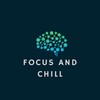

Focus and Chill - productivity tactics for AuDHDers and other neurodivergent folks
Jeremy Nagel and Joey K
Welcome to the Focus and Chill podcast where we discuss productivity tactics that work for AuDHDers and other neurospicy people.
Every episode we interview guests with lived experience of neurodivergence who also have a solid productivity and habit game and pass the learnings on to you, our wise and benevolent audience.
Podcast sponsored by https://focusbear.io
Every episode we interview guests with lived experience of neurodivergence who also have a solid productivity and habit game and pass the learnings on to you, our wise and benevolent audience.
Podcast sponsored by https://focusbear.io
Episodes
Mentioned books
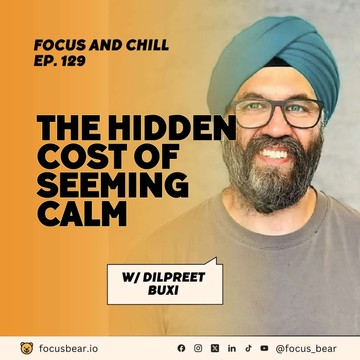
Jan 26, 2026 • 36min
The Hidden Cost of Seeming Calm – Dilpreet Buxi on ADHD and Masking | Ep 129
Calm on the outside. Spiraling on the inside.Dilpreet Buxi shares what it was like to grow up masking anxiety, living with a constantly racing mind, and slowly realizing his nervous system works differently.If you struggle with chronic stress, masking, emotional dysregulation, or feeling “fine” while everything feels too much inside, this episode explores why stress begins in the body, how autistic and ADHD nervous systems process stress differently, and what actually helps.Dilpreet Buxi is the CEO and Co-founder of Philia Labs, a Melbourne-based company using wearable technology and biomedical engineering to make stress measurable and manageable. With a PhD in Electrical Engineering from Monash University, his work focuses on supporting autistic people, people with anxiety, and their caregivers through objective stress measurement and early intervention.Episode Highlights:00:03:05 — Masking anxiety behind calm He describes learning to appear calm while feeling deeply stressed inside. The disconnect between outer presentation and inner reality shaped how he understood himself.00:07:27 — Realizing he may be neurodivergent After pivoting his company toward supporting autistic people, he began recognizing the same patterns in his own life. Reading about nervous system differences forced uncomfortable self-reflection.00:13:00 — Choosing to pivot or shut down After hearing caregiver stories, the team faced a choice: pivot or wind down the company. The decision became personal when his co-founder connected the mission to his autistic brother.00:19:00 — Acute vs chronic stress He explains the difference between moment-to-moment stress and stress that reshapes the body over months. Chronic stress quietly drives fatigue, sleep problems, and emotional dysregulation.00:24:16 — You can’t outthink stress Stress regulation starts in the body, not the mind. Movement, breathing, and vagus-nerve-stimulating practices matter more than positive thinking.00:32:23 — Winding down for real sleep Evening yoga, meditation, gratitude, and keeping the phone out of reach help his nervous system switch into rest mode. Better sleep becomes the foundation for everything else.Connect with Dilpreet:LinkedIn: https://www.linkedin.com/in/dilpreet-buxi/Website: https://solutions.philialabs.com.au/Connect with Jeremy:LinkedIn: https://linkedin.com/in/nageljeremyEmail: jeremy@focusbear.ioMore from Focus Bear:Website: https://focusbear.ioLinkedIn: https://www.linkedin.com/company/focus-bear/Youtube: https://www.youtube.com/@focusbearappTwitter: https://twitter.com/focusbear1Instagram: https://www.instagram.com/focus_bear/Facebook: https://www.facebook.com/focusbearapp/Podcast: https://podcast.focusbear.ioTiktok: https://www.tiktok.com/@focusbear
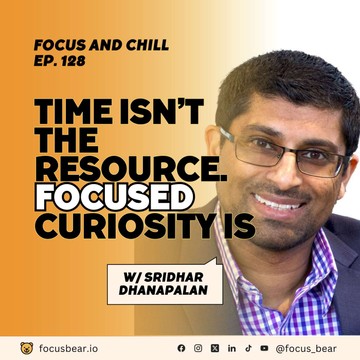
Jan 18, 2026 • 45min
Late-Diagnosed Autism + ADHD: Sridhar on Focused Curiosity, Calm & Growth – Ep 128
Time isn’t your greatest resource. Focused curiosity is.In this episode, Sridhar Dhanapalan shares how being late-diagnosed with autism and ADHD reshaped his approach to focus, motivation, emotional regulation, and productivity at work. We talk about “focused curiosity” as a core resource, hyperfocus as both a gift and risk, the role of purpose-driven alignment, and practical strategies like focus modes, yoga rituals, and Gmail Priority Inbox to reduce overwhelm and protect deep work.Sridhar Dhanapalan is an Enterprise Agile Coach at IBM Consulting and a mindset coach who helps teams and individuals align purpose, values, and execution. He brings a “thinking-first” approach to productivity and leadership, with lived experience as a neurodivergent parent and late-diagnosed autistic + ADHD adult.Episode Highlights:00:01:00 — Late diagnosis as an opportunity for growth Sridhar shares that he was diagnosed with autism under 12 months ago, and ADHD about 10 months ago. Instead of treating it as a setback, he frames it as a curiosity-driven opportunity to grow and better support his neurodivergent children. 00:04:00 — Screeners missed ADHD… but the full assessment didn’t He explains how ADHD screeners showed “nothing,” even though something clearly felt missing. He took a chance on a full ADHD assessment anyway, and it revealed ADHD, which clarified patterns he’d struggled to explain for years. 00:06:00 — “Time isn’t our greatest resource. Focused curiosity is.” Sridhar challenges the common idea that time is the most valuable resource. For him, the key is turning curiosity into a laser: compartmentalizing attention and focusing curiosity is what unlocked sustained growth and confidence. 00:09:00 — Hyperfocus: superpower AND kryptonite He describes hyperfocus as incredibly productive, but dangerous without strict boundaries. When he doesn’t put time limits around it, he burns out, stays up too late, crashes, and loses momentum the next day. 00:11:00 — Emotional regulation is the foundation for clear thinking Sridhar explains why calming the nervous system matters: emotions fire first, and critical thinking only works well once the mind is regulated. Yoga, breathing, and mindfulness become practical tools for keeping the “fast brain” from hijacking decision-making. 00:18:00 — Productivity begins with “thinking first” and purpose He argues most productivity advice focuses too much on implementation (“do, do, do”). His approach starts with purpose and alignment first, so decisions become simpler and focus becomes easier to protect. 00:24:00 — Automating focus: do-not-disturb + yoga rituals Sridhar shares how he uses focus mode and automation to reduce friction. For example, his phone automatically switches to do-not-disturb during yoga so he can create space mentally without distractions.00:26:00 — Email overwhelm solution: Gmail Priority Inbox He recommends Priority Inbox as a surprisingly powerful tool that most people ignore. Training the inbox helps him focus on what matters and mentally categorize everything else as “other,” reducing overload.00:29:00 — Motivation hack: use “towards” AND “away from” Sridhar explains motivation as both purpose-driven movement toward a goal and awareness of the pain of staying stuck. The key is defining the “towards” first so “away from” doesn’t turn into anxious chaos and avoidance.00:41:00 — Final message: create space + be kind to yourself He closes with a grounded summary: build space in your mind, focus your curiosity (especially inward), practice self-compassion, and remember everyone experiences the world through different internal “maps.”Connect with Sridhar:LinkedIn: https://www.linkedin.com/in/sridhard/Connect with Jeremy:LinkedIn: https://linkedin.com/in/nageljeremyEmail: jeremy@focusbear.ioMore from Focus Bear:Website: https://focusbear.ioLinkedIn: https://www.linkedin.com/company/focus-bear/Youtube: https://www.youtube.com/@focusbearappTwitter: https://twitter.com/focusbear1Instagram: https://www.instagram.com/focus_bear/Facebook: https://www.facebook.com/focusbearapp/Podcast: https://podcast.focusbear.ioTiktok: https://www.tiktok.com/@focusbear
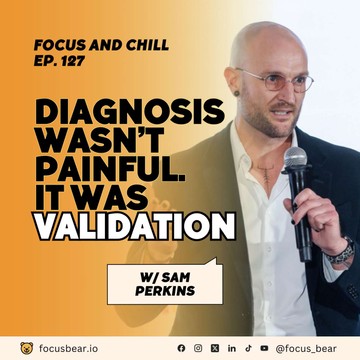
Jan 18, 2026 • 51min
Late-Diagnosed ADHD + Autism: Sam Perkins on Validation, Work Strengths & Emails – Ep 127
What if your biggest “flaws” were actually invisible load you’ve carried for years?Sam Perkins is the CEO of Cellular Agriculture Australia. He’s a proudly neurodivergent leader with 15+ years across academia, humanitarian work, and industry, and a PhD in aeronautical engineering. Sam now helps shape the future of food through policy, ecosystem building, and innovation.In this episode, Sam shares what changed after being late-diagnosed with dyslexia, ADHD, and autism and how it reshaped his work, identity, and communication.If you’ve ever felt overwhelmed by “simple tasks,” struggled with memory, found networking exhausting, or questioned your productivity, this episode gives a brutally honest look at neurodivergent leadership, ADHD working styles, and practical self-advocacy that improves real life (not just motivation).Episode Highlight:00:01:58 — The dyslexia diagnosis that finally made sense Sam explains how a book conversation exposed a gap: he was deeply engaged while reading, but couldn’t recall what he’d just absorbed. That moment led him to the Cambridge Disability Center and a dyslexia diagnosis that “validated what we already knew.”00:04:00 — ADHD and autism: “Someone read my life back to me” After reading Chloe Hayden’s Different, Not Less, Sam recognized his lived experience in her ADHD traits. His formal journey led to an ADHD diagnosis in Oct 2023, followed by therapy and an autism diagnosis in 2024.00:05:30 — The most powerful part wasn’t the label, it was the validation He describes the process as overwhelmingly positive, with self-reflection as the main benefit. It helped him acknowledge the hidden cognitive and emotional load he’d been carrying for years.00:09:45 — How he compensated in uni: rewriting entire textbooks Sam shares a brutally practical workaround: handwriting content word-for-word to slow down processing and improve recall. It worked well when time was flexible, but became a major barrier under exam time limits.00:11:10 — The turning point: leaving Formula One to chase purpose His PhD path originally aimed at Formula One, a childhood dream. But after discovering Buddhism and Eastern philosophy, he questioned the meaning of making cars go faster and pivoted toward purpose and impact.00:14:43 — Autistic networking: the “role” hack that makes it possible Sam says unstructured networking is close to his nightmare. But if he has a clear role (facilitator, presenter), he’s comfortable and effective, proving structure can flip social difficulty into competence.00:19:30 — Meditation for ADHD: it’s not sitting still, it’s training your mind He reframes meditation as “working on your mind,” not forcing stillness. He also notes stimulants helped him access calm more easily, and describes psychedelics as another pathway toward that stereotypical meditative clarity.00:27:40 — Productivity without hustle: time boundaries and knowing your cliff Sam doesn’t obsess over productivity hacks, but he’s strict on time: work hours are work hours. He thrives in an early deep-work block (7am to 1/2pm), then drops “off a cliff,” so he structures life to protect that rhythm.00:37:04 — 70,000 unread emails: why email fails neurodivergent brains Emails are overwhelming because they demand sustained attention on mostly irrelevant written info. Sam explains he rarely reads top-to-bottom, needs clear signposting, and prefers Slack/WhatsApp because channels provide context and reduce cognitive load.Connect with Sam:LinkedIn: https://www.linkedin.com/in/sam-perkins-612b4143/Website: https://www.cellularagricultureaustralia.org/Connect with Jeremy:LinkedIn: https://linkedin.com/in/nageljeremyEmail: jeremy@focusbear.ioMore from Focus Bear:Website: https://focusbear.ioLinkedIn: https://www.linkedin.com/company/focus-bear/Youtube: https://www.youtube.com/@focusbearappTwitter: https://twitter.com/focusbear1Instagram: https://www.instagram.com/focus_bear/Facebook: https://www.facebook.com/focusbearapp/Podcast: https://podcast.focusbear.ioTiktok: https://www.tiktok.com/@focusbear
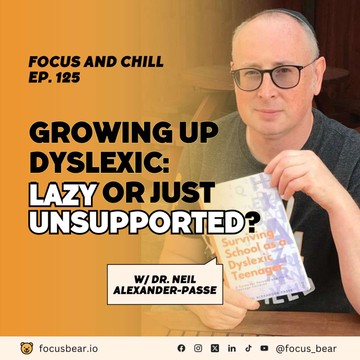
Jan 14, 2026 • 43min
The Hidden Trauma of Dyslexia in School (and How to Heal) – Dr. Neil Alexander-Passe – Ep 125
Growing up neurodivergent can leave you believing you’re stupid or lazy — even when the real issue is the way school is structured.In this episode we interviewed Dr. Neil Alexander-Passe about the lived experience of dyslexia, school-based trauma, and how neurodivergent people make sense of education systems that weren’t designed for them. They discuss identity, learning differences, productivity, and what it means to find ways of working that actually fit.Dr. Neil Alexander-Passe is a psychologist, researcher, and author who has dyslexia himself and has spent over 20 years specialising in the emotional and mental-health experiences of people with learning differences. He has published 18 books (in English and Italian) and 13 peer-reviewed papers on dyslexia and neurodiversity, exploring links with trauma, creativity, success, parenting, and mental health. He completed his PhD in 2018, researching dyslexia, traumatic schooling, and post-school success, and currently works as an exam access assessor while continuing his research and writing.Episode Highlights01:44 – Late dyslexia diagnosis and growing up feeling “stupid”Neil describes being diagnosed with dyslexia at 12 and how years of misunderstanding at school led him to internalise the belief that he was “stupid,” shaping his self-concept well into adulthood.02:40 – Changing schools and not fitting traditional learningHe reflects on moving schools repeatedly and realising later that the issue wasn’t effort or intelligence, but a mismatch between dyslexia and rote, traditional teaching methods.04:13 – Discovering strengths through artNeil shares how art college became the first place where learning made sense, allowing him to build confidence and a career after years of academic failure.05:00 – Returning to education as an adult with the right supportsAs an adult learner, he explains how time, reduced pressure, and practical accommodations transformed his ability to succeed academically.11:21 – ADHD traits and having multiple careersNeil talks about being assessed for ADHD and how having multiple roles and projects suits his neurotype far better than the idea of a single “job for life.”22:30 – Writing at night and layered editingHe describes his non-traditional writing process, including working late at night and using layered editing across digital and paper formats to support focus and clarity.39:02 – Growing up neurodivergent: shame, strengths, and finding your keysIn his closing reflection, Neil explains how neurodivergent children can grow up feeling “stupid or lazy,” and why finding individual strengths — rather than focusing on deficits — is key to long-term wellbeing.Connect with Dr. Neil:LinkedIn: https://www.linkedin.com/in/dr-neil-alexander-passe-0b10b22/Connect with Jeremy:LinkedIn: https://linkedin.com/in/nageljeremyEmail: jeremy@focusbear.ioMore from Focus Bear:Website: https://focusbear.ioLinkedIn: https://www.linkedin.com/company/focus-bear/Youtube: https://www.youtube.com/@focusbearappTwitter: https://twitter.com/focusbear1Instagram: https://www.instagram.com/focus_bear/Facebook: https://www.facebook.com/focusbearapp/Podcast: https://podcast.focusbear.ioTiktok: https://www.tiktok.com/@focusbear
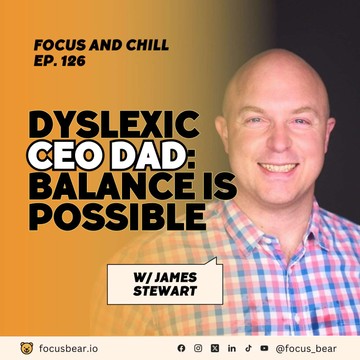
Jan 13, 2026 • 50min
Dyslexia + Parenting + CEO Pressure: James Stewart on Fatherhood & Founder Life – Ep 126
What happens when a dyslexic engineer enters venture capital, climate tech, and leadership? In Ep 126, James Stewart shares how neurodiversity shaped his education, career, parenting, and his work at Always Carbon.James Stewart is a UK chartered mechanical engineer (Cambridge), MBA holder, angel investor, venture partner at Loyal VC, and CEO/co-founder of Always Carbon, a company focused on carbon removal using biochar.Episode Highlights:00:02:04 — Diagnosed dyslexic at six James shares he was diagnosed with dyslexia early, and how it shaped both his educational and professional life. His relationship with dyslexia has changed significantly in recent years, especially in how he now views it as something to build with rather than “fix.”00:03:30 — Swimming saved his confidence A teacher threatened to stop him from going swimming because he struggled in school. That moment helped his parents realize something deeper was happening, and it became the turning point that led to assessment and support.00:07:30 — Cambridge wasn’t neurodiverse-friendly He describes Cambridge in the 2000s as not welcoming for neurodiverse students, despite the prestige. But he credits support systems and learning how to study in ways that worked for his brain as what carried him through.00:10:00 — Neurodiversity drives progress James argues neurodiverse thinkers bring huge value by challenging the status quo and solving problems differently. He frames it as a feature of human evolution: society advances because some people are wired to think outside the “normal” system.00:11:12 — Visual thinking in engineering He strongly agrees dyslexic thinkers often excel in spatial reasoning and 3D thinking, which fits engineering naturally. His approach is visual: diagrams and mind maps beat long documents because they surface structure and meaning faster.00:15:00 — Always Carbon and biochar explained James breaks down biochar simply: plants pull CO2 from the air, and converting plant waste into stable carbon can lock it away for hundreds to thousands of years. The key insight: the same material also improves agriculture through water retention, microbiome support, and fertilizer effectiveness.00:21:11 — Water is everything (and we forget it) Jeremy brings up water utilities and James goes deep into appreciation for reliable clean water. He points out many people don’t realize how fragile water systems can be globally until they experience unsafe supply firsthand.00:27:00 — A venture fund for dyslexic founders James shares he’s investigating launching a VC fund specifically investing in dyslexic and neurodiverse founders. The emotional core here: late diagnosis often comes with trauma, and he’s not willing to accept that as “normal.”00:30:24 — Parenting changes your priorities As a founder dad, he became more ruthless about what deserves his time: if it’s not worth missing time with his child, it’s not worth doing. He also shares a practical scheduling tactic: clustering “unbreakable meetings” on specific days to stay flexible for parenting responsibilities.00:48:30 — Networking is a benevolent act James closes with a powerful lens shift: networking isn’t selfish when your motives are good. It becomes a way to connect people to opportunities they couldn’t reach alone, making networking a form of service.Connect with James:LinkedIn: https://www.linkedin.com/in/james-stewart-a38626/Website: https://www.alwayscarbon.com/Connect with Jeremy:LinkedIn: https://linkedin.com/in/nageljeremyEmail: jeremy@focusbear.ioMore from Focus Bear:Website: https://focusbear.ioLinkedIn: https://www.linkedin.com/company/focus-bear/Youtube: https://www.youtube.com/@focusbearappTwitter: https://twitter.com/focusbear1Instagram: https://www.instagram.com/focus_bear/Facebook: https://www.facebook.com/focusbearapp/Podcast: https://podcast.focusbear.ioTiktok: https://www.tiktok.com/@focusbear
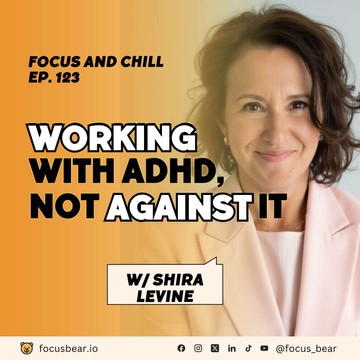
Jan 11, 2026 • 44min
What ADHD Actually Feels Like: Shira Levine on Medication, Focus, and Self-Acceptance – Ep 123
What does ADHD actually feel like in your body and mind?Shira Levine was diagnosed in the 1980s — and describes the moment medication helped her feel grounded for the first time.Shira is a Silicon Valley–trained marketing and customer engagement strategist with decades of experience in retention, loyalty, and community-driven growth. Diagnosed with ADHD as a teenager in the 1980s, she brings a rare long-term perspective on neurodiversity, work, creativity, and self-acceptance.Episode Highlights:00:06:30 — What ADHD feels like in the body Shira describes living with ADHD as walking on pavement covered by a thin layer of water — never fully grounded. Medication didn’t “fix” her, but helped her finally feel present and connected to the world.00:17:20 — Productivity, dragons, and scope creep She explains how neurodivergent people often solve problems that aren’t theirs to solve. Learning when to say no became essential to doing meaningful work.00:18:45 — Ruthless prioritization without shame Shira reframes prioritization not as discipline, but as protection against overwhelm. Seeing too much can be a strength — if boundaries exist.00:29:00 — Why she rejects minimalism Minimalism and rigid productivity systems never worked for her ADHD brain. She gives explicit permission to reject trends that create more shame than clarity.00:30:30 — Fidgets, movement, and regulation From shells to paper clips, Shira explains how keeping her hands busy helps her stay present. Regulation, not stillness, is the goal.00:33:00 — Designing tools for real ADHD lives She describes the need for multidimensional timers that match how neurodivergent people actually multitask. ADHD isn’t a failure of focus — it’s a different operating system.00:35:30 — Night routines and protecting sleep Putting her phone on another floor and reading fiction nightly helped Shira become a “gold medal sleeper.” Structure supports rest, not restriction.00:38:00 — A simple mental exercise for racing thoughts Listing seven things seen and seven things done becomes a grounding practice when sleep feels impossible. Focus follows structure.00:40:30 — Self-acceptance, obsession, and dialing it down Shira reflects on learning to work with ADHD rather than against it. Obsession and intensity aren’t flaws — the work is knowing when to modulate them.Connect with Shira:LinkedIn: https://www.linkedin.com/in/supershiralevineWebsite: https://fanchismo.com/Connect with Jeremy:LinkedIn: https://linkedin.com/in/nageljeremyEmail: jeremy@focusbear.ioMore from Focus Bear:Website: https://focusbear.ioLinkedIn: https://www.linkedin.com/company/focus-bear/Youtube: https://www.youtube.com/@focusbearappTwitter: https://twitter.com/focusbear1Instagram: https://www.instagram.com/focus_bear/Facebook: https://www.facebook.com/focusbearapp/Podcast: https://podcast.focusbear.ioTiktok: https://www.tiktok.com/@focusbear
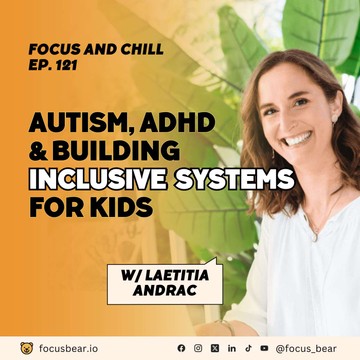
Jan 6, 2026 • 38min
Autism, ADHD & Building Inclusive Systems for Kids with Letitia Andrac – Episode 121
What if nothing was ever wrong with you or your child, just misunderstood?In this episode, Laetitia Andrac shares how late autism and ADHD diagnosis reshaped her identity, parenting, and mission to build truly inclusive systems for neurodivergent children.Laetitia Andrac is a five-time founder, bestselling author, and CEO of Understanding Zoe, an AI-powered platform helping parents, educators, and therapists better support neurodivergent children. Late diagnosed autistic and ADHD, she brings lived experience to systems-level change in education, healthcare, and leadership.Episode Highlights00:00:41 — Discovering neurodivergence through motherhood Laetitia explains how concerns raised about her daughter’s development triggered a deeper exploration of autism and ADHD in her family. What started as advocacy for her child became self-discovery.00:03:00 — Late autism diagnosis and reclaiming identity After initially dismissing autism, Laetitia describes the moment everything clicked. The diagnosis brought relief, validation, and self-compassion.00:06:11 — Childhood exclusion and autistic burnout She shares early experiences of rejection sensitivity, boredom at school, and later autistic burnout in high-pressure consulting roles. These patterns only made sense in hindsight.00:08:42 — From lived experience to systemic change Understanding Zoe was born from the desire to prevent children from growing up confused and unsupported. The goal is shared understanding, not constant parental advocacy.00:09:14 — Why diagnosis should never feel like being “broken” Laetitia emphasizes choosing neurodiversity-affirming clinicians. Diagnosis should explain, not pathologize.00:14:00 — When unmasking is not safe Unmasking is personal, but environments are not always ready. She describes shutdowns caused by neurotypical networking expectations.00:17:56 — Hyperfocus as a real strength Her ability to solve complex problems quickly powered her consulting career. Without recovery time, however, it also led to collapse.00:22:38 — How Understanding Zoe reduces parental load The platform centralizes assessments, therapy notes, and insights so educators and carers can support children consistently.00:29:17 — Productivity through agile, not pressure Letitia explains why agile ways of working suit neurodivergent brains better than rigid schedules.Connect with Laetitia:Websites:https://understandingzoe.com/https://www.essentialshift.co/LinkedIn:https://www.linkedin.com/company/understandingzoehttps://www.linkedin.com/company/essential-shift/Instagram: https://www.instagram.com/understanding.zoehttps://www.instagram.com/essential.shiftConnect with Jeremy:LinkedIn: https://linkedin.com/in/nageljeremyEmail: jeremy@focusbear.ioMore from Focus Bear:Website: https://focusbear.ioLinkedIn: https://www.linkedin.com/company/focus-bear/Youtube: https://www.youtube.com/@focusbearappTwitter: https://twitter.com/focusbear1Instagram: https://www.instagram.com/focus_bear/Facebook: https://www.facebook.com/focusbearapp/Podcast: https://podcast.focusbear.ioTiktok: https://www.tiktok.com/@focusbear
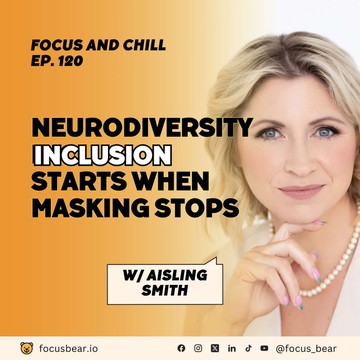
10 snips
Jan 5, 2026 • 1h 1min
Autism, ADHD & Unmasking at Work: Aisling Smith on Neurodiversity Inclusion - Episode 120
Aisling Smith, an award-winning neurodiversity trainer and founder of Neuro Empowerment, shares her journey of self-discovery after her son's autism diagnosis revealed her own ADHD and autism. She discusses the impact of lifelong masking, describing herself as a 'chameleon,' and how unmasking can enhance confidence. Aisling emphasizes the importance of reframing labels as tools for empowerment, outlining seven pillars for creating neuro-inclusive workplaces. She also shares practical strategies for managing productivity and balancing work with personal life.
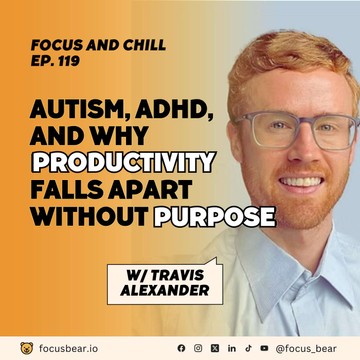
Dec 27, 2025 • 44min
Autism, ADHD, and Why Productivity Falls Apart Without Purpose – Ep 119 with Travis Alexander
“I’m very good at starting things, then halfway through I ask: why am I doing this?”In this episode, Travis Alexander shares an honest conversation about career confusion, productivity struggles, and the long road to self-understanding after late diagnoses of autism, ADHD, and dyslexia. Together, we explore why work can feel harder without clear purpose, how masking shows up in careers and productivity, and what actually helps when motivation keeps collapsing halfway through.Travis Alexander is a science and engineering master’s graduate who has worked across startups, corporate medical technology, and creative projects. Diagnosed with dyslexia, autism, and ADHD later in life, he is now a neurodivergent advocate and author of Stairway to the Spectrum, where he reflects on identity, work, and self-awareness. Outside of work, Travis enjoys breakdancing, running, and spending time with his wife.Episode Highlights: 00:02:02 – Diagnosed with dyslexia, but answers didn’t last Travis shares how his first diagnosis explained some struggles, but didn’t stop problems from resurfacing in work, relationships, and decision-making.00:03:00 – Autism and ADHD discovered much later A decade after dyslexia, Travis realizes autism and ADHD were still unrecognized, helping explain long-standing confusion and burnout.00:09:15 – Self-awareness after late diagnosis Rather than “fixing” productivity, diagnosis gave Travis clarity, closure, and a way to understand past mistakes without self-blame.00:14:30 – Fifteen to twenty jobs and still searching Travis reflects on job-hopping across industries and why finding the right career fit has been so difficult but necessary.00:21:06 – Productivity collapses without a clear ‘why’ He explains why he often starts strong, loses motivation halfway, and how reconnecting to purpose is what actually sustains productivity.00:23:19 – Masking at work and following instructions A candid look at workplace conflict, masking through compliance, and why “just do it this way” can be deeply exhausting for neurodivergent people.Connect with Travis:Website: https://www.travisalexander.com.au/Connect with Jeremy:LinkedIn: https://linkedin.com/in/nageljeremyEmail: jeremy@focusbear.ioMore from Focus Bear:Website: https://focusbear.ioLinkedIn: https://www.linkedin.com/company/focus-bear/Youtube: https://www.youtube.com/@focusbearappTwitter: https://twitter.com/focusbear1Instagram: https://www.instagram.com/focus_bear/Facebook: https://www.facebook.com/focusbearapp/Podcast: https://podcast.focusbear.ioTiktok: https://www.tiktok.com/@focusbear
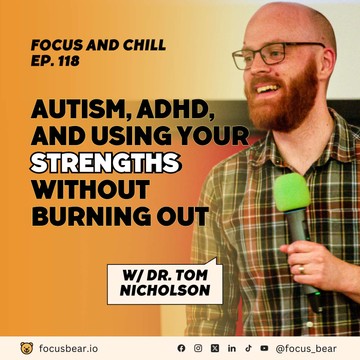
Dec 23, 2025 • 47min
Autism, ADHD, and Using Your Strengths Without Burning Out – Ep 118 with Dr Tom Nicholson
Burnout is your body telling you: stop. I’m going to make you stop.In this episode, Dr Tom Nicholson breaks down how productivity, overperformance, and even “success” can quietly become coping mechanisms that lead to burnout. Drawing from lived experience, academia, and clinical work, he explores how neurodivergent people can use their strengths without masking themselves into exhaustion.Dr Tom Nicholson is an assistant professor of mental health nursing, public speaker, and trainer specializing in neurodivergence and inclusion. He combines lived experience with clinical and academic expertise to help individuals and organizations rethink productivity, burnout, and sustainable ways of working.Episode Highlights 00:02:12 – Diagnosed with ADHD at five and labeled “the problem child” Dr Tom describes being diagnosed in the mid-1990s and quickly framed as disruptive rather than supported. Despite doing well academically, he internalized the message that effort and compliance mattered more than wellbeing, laying the groundwork for overworking later in life.00:03:37 – Discovering autism later in adulthood He explains diagnostic overshadowing and how ADHD became the explanation for every difficulty he had. Autism was missed entirely, even as he became a specialist himself, showing how easily burnout risks can be overlooked when people appear “high functioning.”00:06:08 – Reframing school trauma and constant effort With a later autism lens, Dr Tom revisits his school experiences and recognizes how much energy went into coping, masking, and adapting. This reframing helps explain why productivity and overperformance often feel compulsory rather than optional.00:17:30 – Productivity works in bursts, not all day Dr Tom explains that his productivity comes in intense, focused bursts followed by long recovery periods. Expecting steady, all-day output ignores how many neurodivergent brains actually function and pushes people into boom-and-bust cycles.00:25:23 – Early fatherhood collides with productivity culture He speaks candidly about sleep deprivation, routine collapse, and identity shifts during the first year of parenting. Hustle culture and productivity myths make this period far harder, especially for neurodivergent parents with high sensory and rest needs.00:32:36 – When productivity advice turns into self-punishment Dr Tom reflects on consuming large amounts of self-help and productivity content. Instead of helping, it reinforced the belief that he was never doing enough, turning tools into weapons for self-criticism rather than support.00:39:30 – Burnout as a forced stop After pushing through a PhD, lockdown, and a newborn, his body shut everything down. He describes burnout not as weakness, but as the body enforcing boundaries when the mind refuses to listen.00:44:59 – The question behind overworking The episode closes with a powerful reflection: much productivity is driven by old narratives and the need to prove something. Dr. Tom invites listeners to ask whether their drive comes from genuine values or from trying to outrun past judgments.Connect with Dr. Tom:LinkedIn: linkedin.com/in/dr-tom-nicholson-089727131Instagram: https://www.instagram.com/drtomnicholsonConnect with Jeremy:LinkedIn: https://linkedin.com/in/nageljeremyEmail: jeremy@focusbear.ioMore from Focus Bear:Website: https://focusbear.ioLinkedIn: https://www.linkedin.com/company/focus-bear/Youtube: https://www.youtube.com/@focusbearappTwitter: https://twitter.com/focusbear1


